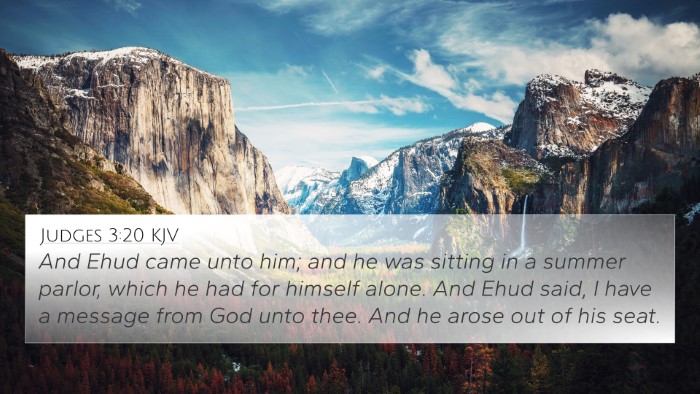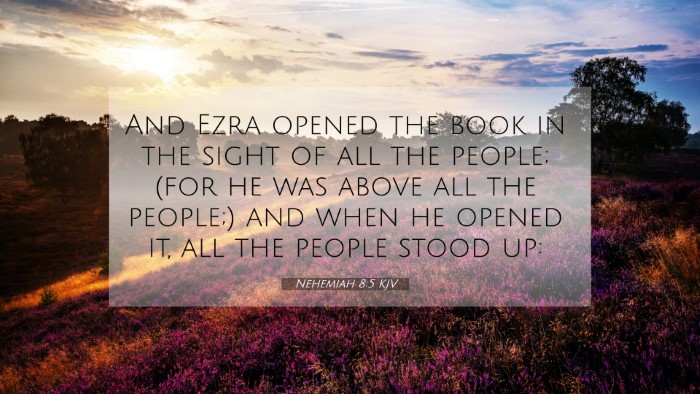Old Testament
Genesis Exodus Leviticus Numbers Deuteronomy Joshua Judges Ruth 1 Samuel 2 Samuel 1 Kings 2 Kings 1 Chronicles 2 Chronicles Ezra Nehemiah Esther Job Psalms Proverbs Ecclesiastes Song of Solomon Isaiah Jeremiah Lamentations Ezekiel Daniel Hosea Joel Amos Obadiah Jonah Micah Nahum Habakkuk Zephaniah Haggai Zechariah MalachiNehemiah 8:5 Similar Verses
Nehemiah 8:5 Cross References
And Ezra opened the book in the sight of all the people; (for he was above all the people;) and when he opened it, all the people stood up:
Uncover the Rich Themes and Topics of This Bible Verse
Listed below are the Bible themes associated with Nehemiah 8:5. We invite you to explore each theme to gain deeper insights into the Scriptures.
Nehemiah 8:5 Cross Reference Verses
This section features a detailed cross-reference designed to enrich your understanding of the Scriptures. Below, you will find carefully selected verses that echo the themes and teachings related to Nehemiah 8:5 KJV. Click on any image to explore detailed analyses of related Bible verses and uncover deeper theological insights.

Judges 3:20 (KJV) »
And Ehud came unto him; and he was sitting in a summer parlor, which he had for himself alone. And Ehud said, I have a message from God unto thee. And he arose out of his seat.

1 Kings 8:14 (KJV) »
And the king turned his face about, and blessed all the congregation of Israel: (and all the congregation of Israel stood;)

Luke 4:16 (KJV) »
And he came to Nazareth, where he had been brought up: and, as his custom was, he went into the synagogue on the sabbath day, and stood up for to read.
Nehemiah 8:5 Verse Analysis and Similar Verses
Understanding Nehemiah 8:5
Nehemiah 8:5 states, "And Ezra opened the book in the sight of all the people; for he was above all the people: and when he opened it, all the people stood up." This verse marks a significant moment in the history of the Jewish people during the post-exilic period as Ezra reads the Law to the assembly. Below, we explore various interpretations and insights into this verse through the lens of public domain commentaries.
Commentary Insights
Matthew Henry's Commentary
Matthew Henry emphasizes the importance of the public reading of Scripture. He notes that the act of opening the book symbolizes the revelation of God’s word to the people, bringing a sense of reverence and expectation among them. The standing of the people signifies their respect and eagerness to hear the Law, indicating a moment of spiritual awakening and commitment to God’s word.
Albert Barnes' Notes on the Bible
Albert Barnes highlights that Ezra's position "above all the people" not only denotes his authority but also his role as a teacher. The physical act of standing reflects a communal response to the reading of God’s word, suggesting unity and a collective desire to immerse in the teachings of the Law. This communal aspect reinforces the idea that worship and learning are integral to the Jewish faith.
Adam Clarke's Commentary
Adam Clarke points out that the location and manner of Ezra’s reading were intentional to foster a greater sense of reverence. He discusses how the people’s act of standing demonstrates honor and readiness to receive instruction. Clarke notes that this moment signifies a restoration of spiritual priorities, reflecting on the centrality of Scripture in worship and community life.
Thematic Connections and Cross-References
Nehemiah 8:5 touches on several themes that are prevalent throughout the Bible. Here are some connections and cross-references that provide deeper insights into the verse:
- Deuteronomy 31:11-12: Moses commanded the reading of the Law to the people, establishing a precedent for communal reverence for Scripture.
- Joshua 8:34-35: Joshua read all the words of the law to the assembly of Israel, highlighting continuity in the practice of reading God's word publicly.
- Psalm 119:162: The psalmist expresses delight in God's word, which aligns with the joy exhibited by the people during the reading.
- Luke 4:16-20: Jesus’ reading from Isaiah in the synagogue exemplifies the significance of proclaiming Scriptures publicly and its impact.
- Acts 2:42: The early church devoted themselves to the apostles' teaching, reflecting the enduring importance of Scripture in community.
- 1 Timothy 4:13: Paul instructs Timothy to devote himself to the public reading of Scripture, paralleling Ezra's role.
- Romans 10:17: Faith comes from hearing the message, emphasizing the necessity of hearing God’s word in building faith.
Conclusion
Nehemiah 8:5 serves as a compelling reminder of the significance of Scripture in the life of believers. The communal act of standing during the reading illustrates both reverence and anticipation for God's word. Understanding this verse through different commentaries enriches our appreciation of the value of public Scripture reading and its role in faith formation.
Exploring Further: Cross-Referencing Biblical Texts
For those interested in further study, consider examining additional Bible verses that relate to the themes of gathering, reverence, and the centrality of God's word in the community. Utilizing tools such as a bible concordance or a bible cross-reference guide will help you identify and explore connections between verses. Engaging in a cross-reference Bible study can deepen your understanding of how various passages interlink and support each other in conveying God's messages.
Encouragement for Personal Study
As you study Nehemiah 8:5 and related verses, remember to consider the purpose of each text in the broader narrative of Scripture. Reflect on how these connections enhance your understanding of God's overarching plan for humanity. Embrace the journey of discovering the links between Old and New Testament teachings, and leverage comprehensive bible cross-reference materials to aid your exploration.


